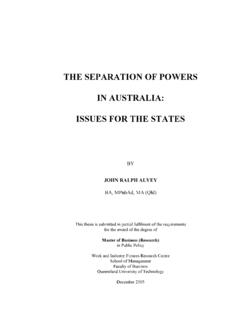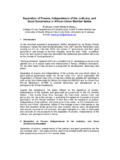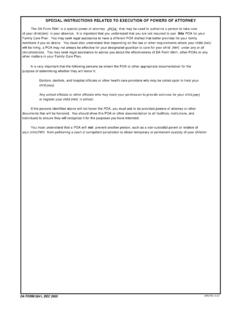Transcription of 4. CAPACITY AND POWERS OF CROWN ENTITIES …
1 1 4. CAPACITY AND POWERS OF CROWN ENTITIES jenny Cassie, Barrister Introduction This chapter discusses the provisions of the CROWN ENTITIES Act which relate to the CAPACITY and exercise of POWERS of statutory ENTITIES and, to a more limited degree, CROWN entity companies and CROWN entity subsidiaries. The commentary covers the generic model as covered by the Act and does not, for example, cover the exercise of POWERS by statutory officers whose POWERS must be exercised independently of an status Statutory ENTITIES , CROWN entity companies and CROWN entity subsidiaries are all bodies corporate and are therefore legal ENTITIES which exist separately from their members, office holders, employees and, importantly, the entity status contrasts with Departments, which are legally part of the CROWN . This separation is illustrated most acutely by the position of statutory ENTITIES that are corporations sole.
2 A single person, for example, the Privacy Commissioner, may have corporate status by virtue of being declared a corporation sole. This enables an artificial line to be drawn between the person as an individual and the office as a legal person. Departments, having no separate legal status, can be established and disestablished by the Government by executive action. By contrast, a statutory entity can only be established or disestablished by legislation. Setting up CROWN entity companies requires registration of a company with Ministers as of statutory ENTITIES CAPACITY describes the legal ability or qualification of an entity to do something. The general rule regarding the CAPACITY of corporations is that:75 The POWERS of a corporation created by statute are limited and circumscribed by the statutes which regulate it and extend no further than is expressly stated therein, or is necessarily and properly required for carrying into effect the purposes of its incorporation, or may be fairly regarded as incidental to, or consequential on, those things which the legislature has authorised.
3 What the statute does not expressly or impliedly authorise is to be taken to be prohibited. 72 Eg. the Director of Civil Aviation. 73 Section 15 CROWN ENTITIES Act 2004 and section 15 Companies Act 1993. 74 See CROWN ENTITIES Act, s79. 75 Halsbury s Laws of England, (4th ed) Corporations, para 1137. 2 Further, general words in a constituent Act which if read literally would enable a statutory corporation to carry on any business or undertaking will be construed as ancillary to the dominant or main objectives for which the corporation was of statutory ENTITIES The CROWN ENTITIES Act divides POWERS of CROWN ENTITIES into: (a) statutory POWERS ; and (b) natural person POWERS . Statutory POWERS In regard to the first head, section 16 of the Act provides that a statutory entity may do anything authorised by this Act or the entity s Act. 77 Natural person POWERS These POWERS might include, for example, a power to issue licences, issue standards, or make decisions according to statute about funding.
4 They may also include coercive POWERS . Natural person POWERS are conferred by section 17 of the CROWN ENTITIES Act, which provides that: (1) A statutory entity may do anything that a natural person of full age and CAPACITY may do. (2) Subsection (1) applies except as provided in this Act or another Act or rule of law. Interpretation of natural person POWERS While the wording is different, there is no difference in substance between the natural person POWERS given to a statutory entity under section 17 of the CROWN ENTITIES Act and the POWERS of a company under section 16 of the Companies Act 1993, which are phrased in terms of CAPACITY . Natural person POWERS include things that were traditionally set out in constituting statutes of statutory corporations such as the power to hold property, to sue and be sued, and the power to enter into binding obligations (contracts). The Court of Appeal has made it clear that natural person POWERS will not be read down.
5 In New Zealand Kiwifruit Marketing Board v Beaumont78 76 Halsbury s Laws of England, Corporations, para 1141. that Court considered section 5A of the Primary Products Marketing Act 1953 which in subsection (1)(a) gave a 77 Note: the entity s Act includes both the Act under which the statutory entity was constituted, and any other Act that expressly provides for the functions, POWERS , or duties of the entity - section 10(1) of the CROWN ENTITIES Act. 78 [1997] 3 NZLR 516 (CA). 3 marketing authority such as the NZKMB Except as provided in this [the] rights, POWERS , and privileges of a natural person . Subsections (2) to (4) provided that: (2) A Marketing Authority does not have a power (whether or not it is a power of a natural person) if the regulations that established it provided that it does not have that power . (3) A Marketing Authority does not have a power (whether or not it is a power of a natural person) if the regulations that established it provided that its POWERS are limited to certain specific POWERS , or POWERS of a specified kind or description, that do not include that power .
6 (4) A Marketing Authority shall not exercise any of its rights, POWERS , or privileges except for the purpose of - (a) performing its functions; or (b) entering into any financial transaction or financial obligation intended to [lessen risk or liability, or maximise income] The Court found that: 79 The structure and purpose of section 5A is to give the board all the POWERS of a natural person. They are not incidental or subsidiary POWERS . They are primary POWERS and are subject only to the limitations as to their existence set out subss (2) and (3) and as to their exercise set out in subs (4). Further, it does not appear that the courts will lightly imply a limitation on natural person POWERS . In the Kiwifruit case counsel argued that while there was no express limitation in the relevant regulations, the limitation arose by necessary implication from the legislation (Act and regulations) as a whole. In response the Court said that:80A limitation on an express power arising by necessary implication is not a conceptual impossibility, but the implication would have to arise very clearly from the constituting regulations.
7 There is no such clear implication arising from the board s regulations. Not surprisingly, the Courts have confirmed that the existence of natural person POWERS does not give a statutory entity the power to override a statute. In Mansell v Legal Services Agency81 79 Above n 78, 524 Tipping J, on behalf of Richardson P, Thomas, Keith and Tipping JJ. the Court of Appeal considered the appellant s contention that natural person POWERS gave the LSA the power to waive a statutory time limitation on the filing of applications for legal aid on the basis that the time limit was: 80 Above n 78, 520. 81 CA 167/03, 12 November 2004. 4 (a) a matter of practice and procedure; (b) entirely for the Agency s benefit; and (c) no public interest was involved. The Court said that:82A natural person does not have the power to waive a statutory requirement binding on him or her. Constraints on the exercise of POWERS by statutory ENTITIES POWERS must be exercised for the purposes of functions At common law, the POWERS of a statutory corporation must be used for the purposes of performing its functions.
8 For statutory ENTITIES this constraint is set out in section 18 of the CROWN ENTITIES Act, which provides: A statutory entity may do an act under section 16 or section 17 only for the purposes of performing its functions. The functions of a statutory entity are defined in section 14 of the Act as: (a) the functions set out in the entity s Act; and (b) if the entity s Act gives the responsible Minister power to add functions, any other functions that the responsible Minister may direct the entity to perform in accordance with that Act and section 112 of this Act; and (c) any functions that are incidental and related to, or consequential on, its functions set out in paragraphs (a) and (b). It is of course a matter of statutory interpretation whether in any particular case, the proposed actions of an entity lie within its functions. In New Zealand Kiwifruit Marketing Board v Beaumont the Court of Appeal summarised the exercise that must be undertaken as the board s [natural person POWERS ], may be exercised depends on whether the proposed exercise is for the purpose of performing the board s functions.
9 The dichotomy between the existence of the power and the legitimacy of its proposed exercise is inherent in the structure and language of [the empowerment section] ..[The legitimacy question] will involve a detailed factual inquiry against the functions of the [This] aspect 82 Above n 81, para 30. 83 Above n 78, 524. 5 upon the purpose for which the power is to be exercised and whether there is a sufficient relationship between that purpose and the board s functions. It is unclear whether paragraph (c) of section 18 of the CROWN ENTITIES Act, which extends a statutory entity s functions to include any functions that are incidental and related to or consequential on its functions set out in paragraphs (a) and (b) is intended to extend the law. Arguably it does no more than restate the common law position in relation to POWERS , as an exercise in relation to functions, partially reflecting the fact that in many cases what are now considered to be functions were in early statutes expressed as That is, the common law recognised that an entity s POWERS extended to those POWERS that were necessarily and properly required for carrying into effect the purposes of its incorporation, or may be fairly regarded as incidental to, or consequential on, those things which the legislature has authorised.
10 85 It also read any general POWERS that would enable a corporation to carry on any activities as ancillary to the dominant or main objectives for which the corporation was formed. It is doubtful that the Courts will read paragraph (c) as enabling the performance of functions, which would formerly have been outside the POWERS of a this regard, the question of what is incidental to an authorised business has never been an easy one as their Lordships acknowledged in A-G v Mersey Rly Co, 87 where the House of Lords considered whether a railway company had the power to run a bus service. In that case Lord Loreburn LC said:88 The rule of law has been laid down in this House to the effect that it must be shewn that the business can fairly be regarded as incidental to or consequential upon the use of the statutory POWERS ; and it is a question in each case whether it is so or whether it is not so. Unhelpfully, Lord Macnaghten then went on to confirm that:89 The question is this: Is the business of omnibus proprietors as the defendants were carrying it on when the action was brought reasonably 84 But also reflecting the fact that the power (ie.)






